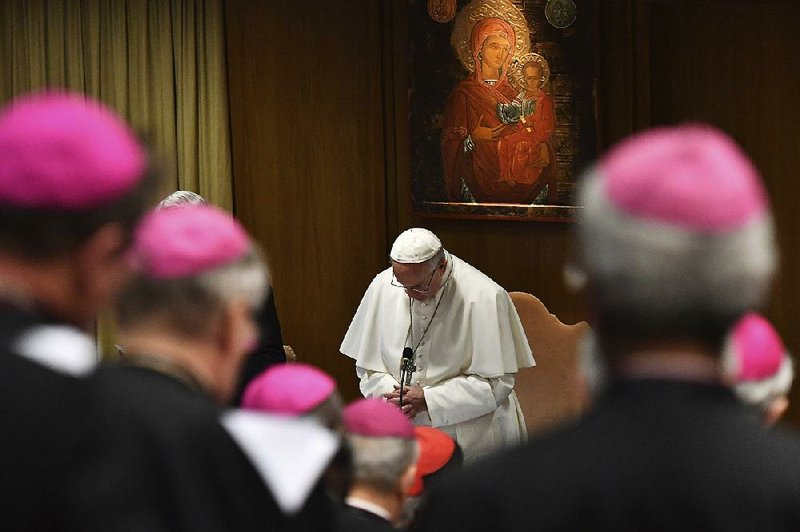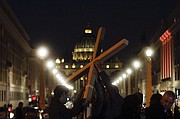VATICAN CITY -- Pope Francis opened a landmark meeting Thursday on clerical sexual abuse, saying that Catholics expected "concrete and effective measures" against the scourge -- the kind of steps that have eluded the Vatican for decades.
"Hear the cry of the little ones who plead for justice," Francis said, noting that the church was beyond the phase of "predictable condemnations."
The pontiff's remarks, issued to the 190 bishops and Catholic leaders who have descended on Rome, set a notably firm tone for the beginning of the four-day meeting -- the highest-profile test to date of whether the Roman Catholic Church is equipped to deal with its central crisis.
Outside the fenced-off area where the bishops gathered, victims of abuse from around the world expressed frustration with the church's long-standing pattern of protecting the institution, treating victims with skepticism and burying cases with monetary settlements.
Some of the comments made by church leaders seemed to acknowledge that reality.
"We have to recognize this crisis in its full depth: To realize that the damage is not done by outsiders but that the first enemies are within us, among us bishops and priests and consecrated persons," Cardinal Ruben Salazar Gomez, the archbishop of Bogota, Colombia, told the bishops in one of the day's three official presentations. "We have to recognize that the enemy is within."
The pope and the Vatican face intense pressure to persuade bishops from around the world to confront the issue, even in regions where abuse scandals have not yet surfaced publicly, and where some church leaders are skeptical about the severity of the problem. But church officials have called the meeting one phase in a long process, not a cure-all.
The meeting's first day involved a mix of prayer, emotional appeals and discussions on specifics. In a room that looked like a college auditorium, rows of bishops listened to speeches and took notes. Francis delivered 21 "reflection points" -- ideas for handling abuse that one organizer, Archbishop Charles Scicluna of Malta, described as a "road map" for discussion in following days.
"It's an understatement to say [these ideas] have to be taken seriously," Scicluna said.
Among those ideas, the pope raised the possibility of establishing rules that incorporate lay experts into abuse investigations. He also suggested creating "specific protocols" for handling accusations against bishops. The pope said that the church -- likely at the local level -- should consider having a clear contact for victims who want to report crimes.
Though advocates for a church overhaul said some of the ideas would help, they noted that Francis' points stopped short of a change to church law that would force clerics found guilty of abuse to be defrocked. One of the possibilities Francis raised is that the church should assess the crime -- with the "traditional principle of proportionality" -- and decide whether "priests and bishops guilty of sexual abuse of minors leave the public ministry."
"If a priest assaults a child somewhere, is he going to be taken out of ministry by Monday morning and turned over to civil authorities?" said Peter Isely, a founding member of Ending Clergy Abuse, a global survivors and activists group. "Are they going to make that law, so it's crystal clear to every one of them?"
Despite Francis' call for concrete steps, organizers have said the meeting is designed foremost to be educational -- emphasizing the imperative not to bury abuse accusations. They have also said the church is not aiming to draw up a single, global standard for dealing with abuse. Corrupt legal systems or draconian laws in some countries make it unrealistic, church officials have said, for the Vatican to mandate that all bishops report abuse accusations to criminal authorities -- a standard that is common within the U.S. church.
"You cannot have a one-size-fits-all that comes out of this," Cardinal Blase Cupich of Chicago said in an interview. "They won't be told: This is exactly what you have to do."
SURVIVORS SPEAK
More than 30 years after the scandal first broke out in Ireland and Australia, and 20 years after it hit the U.S., bishops and Catholic officials in many parts of Europe, Latin America, Africa and Asia still either deny that clergy sex abuse exists in their regions or play down the problem.
Francis called the summit after he botched a well-known sex-abuse cover-up case in Chile last year.
He is now in the midst of a drastic overhaul of Chilean church leadership. He also recently affirmed the church decision to defrock former Cardinal Theodore McCarrick, a onetime church power broker accused of abusing minors and adults.
The notion that the abuse scandal had reached into the highest levels of the church was evident Thursday, starting when Cardinal Luis Antonio Tagle, a Filipino widely seen as a future papal candidate, said bishops have wounded the faith with their behavior on abuse.
"Our lack of response to the suffering of victims, even to the point of rejecting them, and covering up the scandal to protect the perpetrators and the institution, has injured our people," Tagle said.
The event is closed to the press, but the Vatican is live-streaming certain moments, including the remarks from the pope and the three official presentations that are planned for each day. Working-group sessions and question-and-answer periods are not being broadcast.
The tone for the high-stakes gathering was set at the start, with victims from five continents -- Europe, Africa, Asia, South America and North America -- telling the bishops of the trauma of their abuse and the additional pain the church's indifference caused them.
No survivors of clergy abuse spoke in person at the meeting, but the Vatican played recorded testimony Thursday. One survivor described the "total loss of the innocence of my youth." Another, from Asia, described abuse as a "time bomb" happening in the region and said the problem could destroy "whole generations" of children.
A woman from Africa said she was so young and trusting when her priest started raping her that she didn't even know she was being abused.
"He gave me everything I wanted when I accepted to have sex; otherwise he would beat me," she told the bishops. "I got pregnant three times and he made me have an abortion three times, quite simply because he did not want to use condoms or contraceptives."
Another victim described receiving a skeptical reception from church authorities after reporting abuse.
"The first thing they did was to treat me as a liar, turn their backs and tell me that I, and others, were enemies of the church," the victim said. "This pattern exists not only in Chile. It exists all over the world, and this must end."
"You need to repair what has been done to the victims, be close to them, believe them and accompany them," the person continued. "You are the physicians of the soul, and yet, with rare exceptions, you have been transformed -- in some cases -- into murderers of the soul, into murderers of the faith."
Information for this article was contributed by Chico Harlan and Stefano Pitrelli of The Washington Post; and by Nicole Winfield of The Associated Press.
A Section on 02/22/2019

